
North Carolina is a state located in the southeastern region of the United States. North Carolina is the 28th largest and 9th-most populous of the 50 United States. It is bordered by Virginia to the north, the Atlantic Ocean to the east, Georgia and South Carolina to the south, and Tennessee to the west. Raleigh is the state's capital and Charlotte is its largest city. The Charlotte metropolitan area, with an estimated population of 2,569,213 in 2018, is the most populous metropolitan area in North Carolina, the 23rd-most populous in the United States, and the largest banking center in the nation after New York City. The Raleigh metropolitan area is the second-largest metropolitan area in the state, with an estimated population of 1,362,540 in 2018, and is home to the largest research park in the United States, Research Triangle Park.
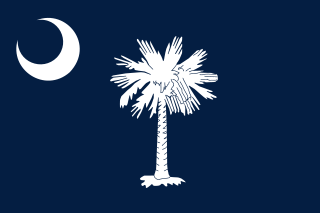
South Carolina is a state in the Southeastern United States and the easternmost of the Deep South. It is bordered to the north by North Carolina, to the southeast by the Atlantic Ocean, and to the southwest by Georgia across the Savannah River.

Raleigh is the capital of the state of North Carolina and the seat of Wake County in the United States. Raleigh is the second-largest city in the state, after Charlotte. Raleigh is known as the "City of Oaks" for its many oak trees, which line the streets in the heart of the city. The city covers a land area of 142.8 square miles (370 km2). The U.S. Census Bureau estimated the city's population as 474,069 as of July 1, 2019. It is one of the fastest-growing cities in the country. The city of Raleigh is named after Sir Walter Raleigh, who established the lost Roanoke Colony in present-day Dare County.

North Carolina State University is a public land-grant research university in Raleigh, North Carolina. Founded in 1887 and part of the University of North Carolina system, it is the largest university in the Carolinas. The university forms one of the corners of the Research Triangle together with Duke University in Durham and The University of North Carolina at Chapel Hill.

The University of North Carolina is the multi-campus public university system for the state of North Carolina. Overseeing the state's 16 public universities and the NC School of Science and Mathematics, it is commonly referred to as the UNC System to differentiate it from its flagship, UNC-Chapel Hill.

The governor of North Carolina is the head of state and head of government of the U.S. state of North Carolina. The governor directs the executive branch of the government and is the commander in chief of the military forces of the state. The current governor, Democrat Roy Cooper took office on January 1, 2017, and had a public swearing-in ceremony on January 7, 2017.
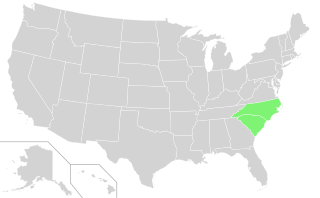
The Carolinas are the U.S. states of North Carolina and South Carolina, considered collectively. They are bordered by Virginia to the north, Tennessee to the west, and Georgia to the southwest. The Atlantic Ocean is to the east. Combining North Carolina's population of 10,042,802 and South Carolina's of 4,896,146, the Carolinas have a population of 14,938,948 as of 2015. If the Carolinas were a single state of the United States, it would be the fifth-most populous state, behind California, Texas, Florida, and New York. The Carolinas were known as the Province of Carolina during America's early colonial period, from 1663 to 1710. Prior to that, the land was considered part of the Colony and Dominion of Virginia, from 1609 to 1663. The province, named Carolina to honor King Charles I of England, was divided into two colonies in 1729, although the actual date is the subject of debate.

The North Carolina General Assembly is the bicameral legislature of the State government of North Carolina. The legislature consists of two chambers: the Senate and the House of Representatives. The General Assembly meets in the North Carolina Legislative Building in Raleigh, North Carolina, United States.

The North Carolina Senate is the upper chamber of the North Carolina General Assembly, which along with the North Carolina House of Representatives—the lower chamber—comprises the state legislature of North Carolina.

The North Carolina House of Representatives is one of the two houses of the North Carolina General Assembly. The House is a 120-member body led by a Speaker of the House, who holds powers similar to those of the President pro-tem in the North Carolina Senate.

Roy Asberry Cooper III is an American politician and attorney who has served as the 75th Governor of North Carolina since January 1, 2017. A member of the Democratic Party, Cooper had previously served as the elected Attorney General of North Carolina since 2001. Prior to that, he served in the General Assembly in both the North Carolina House of Representatives and the North Carolina Senate.
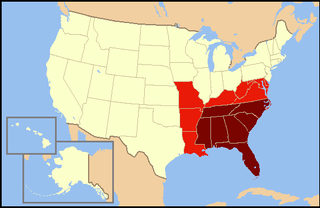
The Southeastern United States, also referred to as the American Southeast or simply the Southeast, is, broadly, the eastern portion of the Southern United States and the southern portion of the Eastern United States. It comprises at least a core of states on the lower East Coast of the United States and eastern Gulf Coast. Expansively, it includes everything south of the Mason–Dixon line, the Ohio River and the 36°30' parallel, and as far west as Arkansas and Louisiana. There is no official U.S. government definition of the region, though various agencies and departments use different definitions.

Box turtles are North American turtles of the genus Terrapene. Although box turtles are superficially similar to tortoises in terrestrial habits and overall appearance, they are actually members of the American pond turtle family (Emydidae). The twelve taxa which are distinguished in the genus are distributed over four species. They are largely characterized by having a domed shell which is hinged at the bottom, allowing the animal to retract its head and legs and close its shell tightly to protect itself from predators.
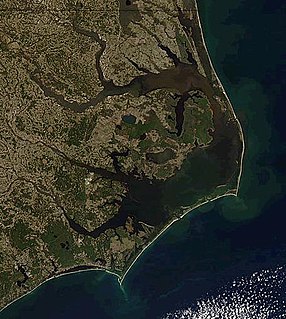
The Outer Banks are a 200-mile-long (320 km) string of barrier islands and spits off the coast of North Carolina and southeastern Virginia, on the east coast of the United States. They cover most of the North Carolina coastline, separating Currituck Sound, Albemarle Sound, and Pamlico Sound from the Atlantic Ocean.
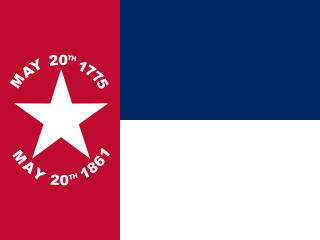
During the American Civil War, North Carolina joined the Confederacy with some reluctance, mainly because neighboring Virginia had done so. Throughout the war, North Carolina remained a divided state. The population within the Appalachian Mountains in the western part of the state mostly continued supporting the Union. Even so, North Carolina contributed more troops to the Confederacy than any other state, and channeled many vital supplies through the major port of Wilmington, in defiance of the Union blockade.
The North Carolina–NC State rivalry, also known as the Carolina–State Game, North Carolina–NC State game, NCSU–UNC game, and other similar permutations, is an ongoing series of athletic competitions between the University of North Carolina at Chapel Hill and North Carolina State University. The intensity of the game is driven by the universities' similar sizes, the fact the schools are separated by only 25 miles, and the large number of alumni that live within the state's borders. Both are charter members of the Atlantic Coast Conference (ACC) and are part of the Tobacco Road schools. The most popular games between the two are in football, basketball, and baseball.

The 2016 United States presidential election in North Carolina was won by Republican nominee Donald Trump on November 8, 2016, with a 3.67% winning margin, as part of the 2016 general election. North Carolina voters chose 15 electors to represent them in the Electoral College via a popular vote.
This is a list of elections in the U.S. state of North Carolina.















